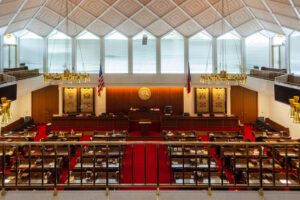North Carolina, the United States’ leader in tobacco production, could face economic fallout from the Trump administration’s recent tariff increases, which have set off a spiraling trade war, Katherine Zehnder wrote for The Carolina Journal. North Carolina exported $533 million in tobacco last year, producing 260.1 million pounds annually, accounting for 60% of U.S. tobacco production.
“I know tobacco growers are busy planting their crops now to honor the 2025 contracts they have in place with China,” Steve Troxler, commissioner of the North Carolina Department of Agriculture and Consumer Services said. “In the meantime, we continue to monitor these trade negotiations very closely, waiting to see what the outcome will be because it is a very fluid situation. Going back to the last trade negotiations that were initiated, the president was very good about helping farmers who had adverse effects. In fact, he was the first president in a very long time who included tobacco.”
North Carolina has 822 tobacco farms, generating a revenue of $557 million and adding $197 million to the state’s GDP, according to Regulatory Smoke: The Economic Impacts of Proposed FDA Tobacco Regulations, a report from the John Locke Foundation. Tobacco manufacturers in the state generate $36 billion in output and contribute $31 billion to the state’s GDP, employing approximately 5,000 workers and paying them $370 million in wages. The tobacco wholesale sector brings in $15.3 billion in revenue, adds $9 billion to the GDP, and supports around 4,500 jobs.
“Historically, tobacco exports have been a vital part of North Carolina’s agricultural strength, with countries like China, Japan, and the European Union serving as major buyers of our tobacco,” said Kelly Lester, policy analyst for the Center for Food, Power and Life at the John Locke Foundation. “When tariffs were imposed during the last trade war, China dramatically reduced its tobacco imports from the US, dealing a blow to farmers here at home. A repeat of that scenario could once again destabilize the market, lower prices, and put immense financial pressure on growers who are already navigating inflation, labor shortages, and tightening regulations.”
The imposed tariffs could result in a significant downturn in these numbers. International markets, such as China, could also see a substantial downturn in exports due to increased tariffs, which would have a trickle-down effect on the state’s economy and agriculture sector. Last month, China announced plans to impose a 10% tariff on North Carolina exports, which include fruits and vegetables. In addition, China’s tariff on US goods was recently increased from 34% to 84%.
“It was pretty predictable that China was going to have a big impact, and they have, and they’re going to attack tobacco pretty hard because they know that that’s part of the soft underbelly in the agriculture sector,” State Rep. Jimmy Dixon, said. “I do not expect it to be permanent; I think that China will come to the negotiating table sooner rather than later, but the temporary reaction will be very tough and difficult and probably be a little bit depressing to our tobacco farmers. I’m telling people I’m personal friends with to hang on; it’s going to be a bumpy ride, but a short bumpy ride.”







 A last-minute addition to a bill related to alcohol sales in North Carolina should expand the number of cigar bars in the state.
A last-minute addition to a bill related to alcohol sales in North Carolina should expand the number of cigar bars in the state.


